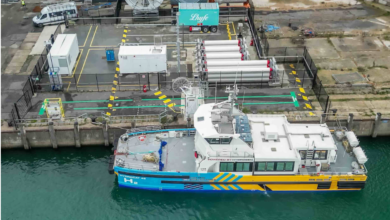ZeroAvia to use Hyzon Motors fuel cell stack
ZeroAvia will assess Hyzon’s hydrogen-powered on-road commercial vehicles technology in aircraft application.

Hyzon Motor (a supplier of zero-emission hydrogen fuel cell-powered heavy vehicles) announced today (6th September) that ZeroAvia ordered Hyzon’s next-generation, high-performance, lightweight fuel cell.
ZeroAvia will evaluate fuel cells for use in its zero-emission aircraft development program. It will test the fuel cell stack through simulated aeroplane duty cycles. These tests will include customary power needs such as take-off, cruising, landing and taxiing, rapid changes in altitude and other ambient conditions. Following validation of the fuel cell stack in a ground test program, the next step will be to test them in flight.
High-density power is crucial in aviation to minimise weight while providing sufficient power for the desired performance. Hyzon’s fuel cell stack has a high power density, which achieves a volumetric power density above 6.0 kW/litre and gravimetric power density over 5.5 kW/kg, well above industry averages.
Hyzon achieves high power density through a combination of proprietary technologies in the Bipolar Plate and Membrane Electrode Assembly (MEA), where electrochemical reactions take place to generate power. Hyzon’s technology maximises the utilisation of the catalyst found in the MEA.
Val Miftakhov, founder and CEO of ZeroAvia, said, “We are always interested in exploring new technologies for our powertrains.”
Craig Knight, Hyzon CEO, said, “The fuel cell stack doesn’t care what it powers. Whether it’s in an 18-wheeler, crane, train or airplane, the fuel cells operate very much the same way.”
Hydrogen provides three times higher specific energy content compared to jet fuel and is over 100 times higher than the best batteries today, making it the only viable option for large scale zero-emission aircraft.
